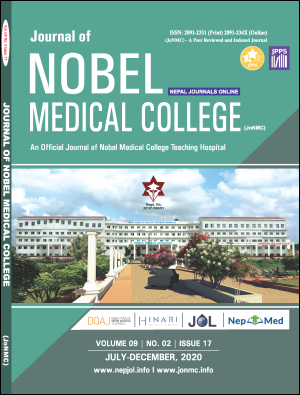Outcome of Endoscopic Retrograde Cholangio-Pancreatography at Nobel Medical College Teaching Hospital: A Single Centre Experience
DOI:
https://doi.org/10.3126/jonmc.v9i2.33323Keywords:
Choledocholithiasis, ERCP, PancreatitisAbstract
Background: Endoscopic retrograde cholangiopancreatography is a technically demanding endoscopic procedure for both diagnostic and therapeutic purpose in treating various pancreaticobiliary diseases. This service is very limited in tertiary care center of our country Nepal mostly limited to Kathmandu valley and Dhulikhel hospital.
Materials and Methods: This is a descriptive cross-sectional study patients who underwent ERCP with therapeutic intent in Nobel Medical College Teaching Hospital, Biratnagar from April 2019 to April 2020. Total 148 patients were included in this study for analysis.
Results: The most common finding was choledocholithiasis in 132(89.2%) patients. Benign biliary stricture was found in 7 (4.7%). Biliary obstruction due to periampullary growth was found in 7 (4.7%) patients. Bile duct injury was found in 1(0.7%) and chronic pancreatitis in 1 (0.7%) patient. The therapeutic success of ERCP was for choledocholithiasis, Stone Clearance in 1st attempt 68.9%, in multiple attempts18.2%, failed stone extraction in 3 cases (2.0%) only biliary stenting was done in 15 (10.3%) patients of various biliary disease for therapeutic and palliative reason. Pancreatic stenting was done in1 (0.7%) patient. The most common complication was Acute Pancreatitis in 6(4.1%), Post-Sphincterotomy bleeding in 1 (0.7%), biliary septic shock in 1 (0.7%) and 1 death (0.7%).
Conclusion: ERCP can be continued in Nobel Medical College Teaching Hospital as it has lots of benefits with minimal acceptable complications.
Downloads
Downloads
Published
How to Cite
Issue
Section
License
JoNMC applies the Creative Commons Attribution (CC BY) license to works we publish. Under this license, authors retain ownership of the copyright for their content, but they allow anyone to download, reuse, reprint, modify, distribute and/or copy the content as long as the original authors and source are cited.




